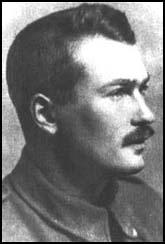Richard Aldington

Richard Aldington was born in Hampshire in 1882. Educated at Dover College and London University he founded the Egotist journal in 1913. He joined the British Army and served on the Western Front in 1916-18 where he was badly gassed. Life for Life's Sake
After the war Aldington published several volumes of poetry including Images 1910-1915 (1915), Images of War (1919), A Fool in the Forest (1925) and A Dream in Luxembourg (1930). His successful novel, Death of a Hero, was a psychological study of a young officer in the First World War.
Aldington also wrote controversial biographies of the Duke of Wellington (1946) and D. H. Lawrence (1950) and an autobiography, Life for Life's Sake (1940).
Richard Aldington died in 1962.
Primary Sources
(1) Richard Aldington, Death of a Hero (1929)
Winterbourne hated the war as much as ever, hated all the blather about it, profoundly distrusted the motives of the War partisans, and hated the Army. But he liked the soldiers, the War soldiers, not as soldiers but as men. He respected them. He was with them. With them, because they were men with fine qualities, because they had endured great hardships and dangers with simplicity, because they had parried those hardships and dangers not by hating the men who were supposed to be their enemies, but by developing a comradeship among themselves. They had every excuse for turning into brutes, and they hadn't done it. True, they were degenerating in certain ways, they were getting coarse and rough and a bit animal, but with amazing simplicity and unpretentiousness they had retained and developed a certain essential humanity and manhood. With them, then, to the end, because of their manhood and humanity. With them, too, because their manhood and humanity existed in spite of the War and not because of it. They had saved something from a gigantic wreck, and what they had saved was immensely important - manhood and comradeship, their essential integrity as men, their essential brotherhood as men.
(2) Richard Aldington, In the Trenches (1917)
Not that we are weary,
Not that we fear,
Not that we are lonely
Though never alone -
Not these, not these destroy us;
But that each rush and crash
Of mortar and shell,
Each cruel bitter shriek of bullet
That tears the wind like a blade,
Each wound on the breast of earth,
Of Demeter, our Mother, Wound us also,
Sever and rend the fine fabric
Of the wings of our frail souls,
Scatter into dust the bright wings
Of Psyche!
(3) Richard Aldington, Impotent (1917)
Impotent,
How important is all this clamour,
This destruction and contest
Night after night comes the moon
Haughty and perfect;
Night after night the Pleiades sing
And Orion swings his belt across the sky.
Night after night the frost
Crumbles the hard earth.
Soon the spring will drop flowers
And patient creeping stalk and leaf
Along these barren lines
Where the huge rats scuttle
And the hawk shrieks to the carrion crow.

